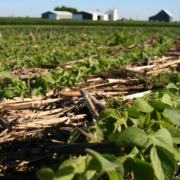Historical Crop Yields Can Provide Soil Health Information
Researchers from Michigan State University published a study in Scientific Reports showing that evaluating historical crop yields across distinct areas of agricultural fields can provide farmers with essential information on soil health characteristics and carbon sequestration. For this project, researchers sought to determine the relationship between historical crop yields and soil health, with the hypothesis that high-performing regions of fields have higher-quality soil and vice versa. Researchers are aiming to reduce the reliance on traditional soil testing by using historical yield data and a novel analysis metric known as yield stability zones. Researchers found that yield stability zones successfully identify differences in areas of fields based on statistically distinct relative soil organic carbon and relative soil health. “These findings suggest that yield stability zones can identify the feedback relationships between soil formation, soil organic carbon accumulation, soil health and yield potential, particularly in terms of increased water and nutrient holding capacity,” said study leader Bruno Basso.

 USDA
USDA USDA Photo by Lance Cheung.
USDA Photo by Lance Cheung. Lynn Betts, NRCS/SWCS
Lynn Betts, NRCS/SWCS